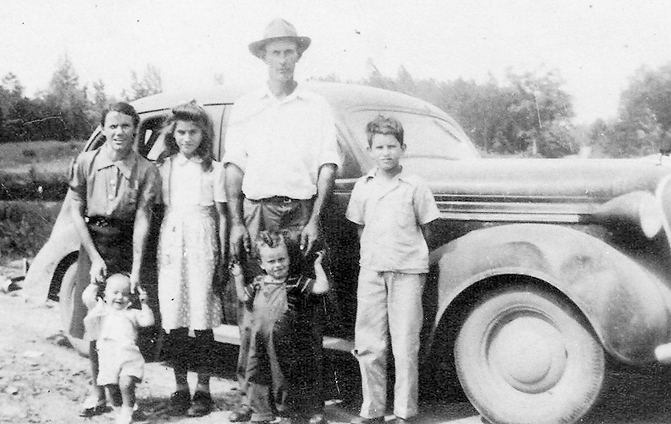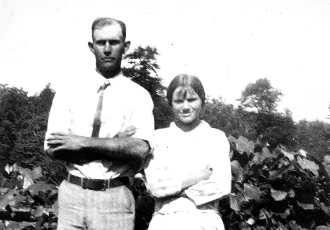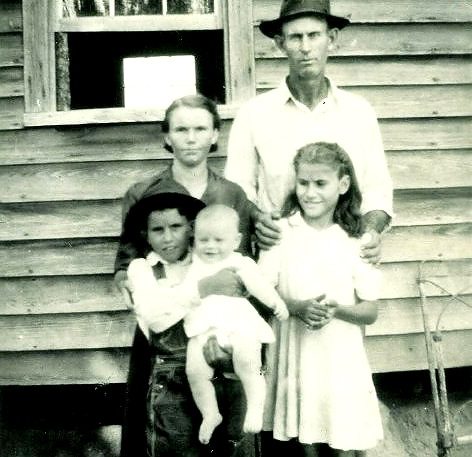Robert Jasper Hall and Pearl Grace Buttrum “To us, my mother was all there was.” —Gladys Hall Smith Pearl Grace Buttrum was just a slip of a girl, five-feet tall if that, under 100 pounds, and not yet 16. Robert Jasper “Bob” Hall was 10 years older and a foot taller, but he was, like her, a quiet, private person. The timing was right. His mother had died in 1919, and he was living with his brother Jim on Trimble Hollow Road just north of Adairsville, Georgia. But Jim and his wife Annie, Pearl’s sister, had just had their third child and things were probably getting crowded in their household. And Pearl’s life at home was not ideal. Her older brothers were both married and had moved away, although one, Tom, and his wife, Mag were neighbors. More importantly, their grandfather, James, 81, had dementia and was terrorizing her and her sisters. Pearl was the daughter of George W. Buttrum, a farmer, and Fannie Mae Carnes, and she was born in Adairsville, Georgia. Her family moved to Shannon, Georgia, before 1920, but by 1930 they had moved to the Lily Pond District of Gordon County, which was just over the county line from Adairsville. They rented a farm next door to the Trimbles on Trimble Hollow road. The Trimble place still exists and sits immediately east of I-75. Jim Hall’s house was on the east end of Trimble Hollow Road, near its junction with Union Grove Road at Gardner’s Spring Road. A one-room school sat near this intersection, and it was to this school that the Buttrum girls walked each day, a distance of over three miles. Pearl and her sisters walked past Bob’s house every day twice a day on their way to and from school, and they had ever reason to stop in and see Annie. Meanwhile, Pearl’s younger sister, Rosa Lee, was ready to wed Joe Bunch, even if she had just turned 14. So, on 14 June 1930, on a mountaintop somewhere on Trimble Hollow Road, Bob and Pearl, along with her sister Rosa Lee and Joe Bunch, were married by Will Turner of Rome, Georgia. Bob and Pearl soon moved to East Highland Mountain, now called Bunch Mountain, just east of I-75 off Pleasant Valley Road. Bunch Mountain was probably named for Joe Bunch’s family or relatives. Joe farmed land near the mountain, north of Dry Creek, for many years. Today, Bunch Road is a fairly straight, paved road connecting Pleasant Valley Road and Mosteller’s Mill Road where the latter crosses Dry Creek. But this road once began with the “Crooked Side,” a series of switchbacks up the face of the ridge and onto the Pleasant Valley plateau. But then, Dry Creek also used to flood before they put in the culverts, which made the name of the creek a real mystery to me as a child. On a dead-end drive off Bunch Mountain Road just above the Crooked Side, Bob and Pearl rented a farm, and nine months almost to the day after they wed, Gladys was born 16 March 1931. They gave their first child the one name only, which made her unique among all her kin and very rare in general, but perhaps they were being economical. Over the remaining 16 years of her life, Pearl would get pregnant nine more times, although only three, all sons, would survive. Pearl Grace, born on 9 November 1914 at the beginning of World War I, would die on 1 July 1947, not long after the end of World War II. She was only 33, and died in a doctor’s office of a heart attack or seizure brought on my some form of undiagnosed intestinal cancer. Gladys said the cancer“ate through” while she was there, and she collapsed. She was in the doctor’s office because she was pregnant and in her eighth month, although she only weighed 92 pounds. As said, the pregnancy was her tenth, so even though she died of complications from cancer, Gladys and others blamed her death on Bob, for keeping her almost constantly pregnant. Yet their marriage, by all accounts, was not uncommon. He was a farmer who owned no land, so they were poor. Sometimes life was harder than usual, depending on the weather and the crops, but sometimes there were good years. Most important, they did not see themselves as deprived. “We were poor,” their son Charles said once, “but we didn’t know we were poor because everyone else we knew was poor, too.” Bob was a quiet, even stoic man, but he could be strong-willed. There were times when he yelled at Pearl and the children, but he never hit her. He did whip his children, but only "when we needed it" his son, still living, said. But he seldom even had to yell. Charles once said that all Bob had to do to get him and his brothers out of bed in the morning was to step into their room and say, in his normal voice, “Get up, boys.” They got up, “because we knew what would happen if we didn’t.” In all, his sons believed him to be a good father. When Pearl died, she was too young for her two youngest sons to have any memory of her at all. Charles, the older of the two, could only remembered his father holding his younger brother while he walked back and forth across the floor in mourning, and wondering what had happened. Papa “liked to lost his mind,” Gladys said. “For months he could feel her floating around over him.” Her oldest son, Bud, died in 1980, and I never thought to ask him about his mother while he was alive. Gladys remembered her with great affection. “I loved my mother dearly,” she said. ““She would listen to us, she was easy going, and she didn’t have an enemy in the world.” Although the life of a farm wife could be a grueling one, and chores had to be done even if a woman was pregnant, Pearl’s frailty probably meant her children did as much as they could to help. Pearl filled her time by crocheting, and, in fact, she sewed constantly. Her death had a lasting impact on my life. Gladys Hall said she would not have gotten married if Pearl had not died. “She would have talked me out of it,” she said, “She had already done it twice.” Unfortunately, in making my life possible, her death made it impossible for me to ever know her. Robert Jasper Hall Many years after Pearl died, Bob married Alma Elizabeth Towe, but I have no date for their marriage, or for her life. They divorced. I visited Papa and Alma once, I think in the early 1970s. They were living in an old farm house near Folsom off Highway 140. On the wall in the living room they had “leather britches,” or dried beans in the shell all strung together. Alma was a fairly tall, thin woman as I recall, and had lost a lot of her sense of taste or smell in her old age, but she could taste sugar. She was an old style Southern cook, so she tended to add grease to everything she cooked. I especially remember her sweet, greasy green beans, although not with great fondness. Papa also had a brief affair with an old school sweetheart in the last year or so before he died, at 73. She spent the night at his house, a large old farmhouse now abandoned on Union Grove Church Road in Gordon County, just north of the site of the old Moravian Mission. The next morning she expressed concern about him to his daughter-in-law: "I'm worried about Bob," she said. They had had sex the night before, but they had sex in the morning, too! He broke up with her because he could not get along with her sons. As seems common, Robert Jasper Hall is a different man to different generations. Gladys remembered him as a man with a temper, but Charles and his last living son remembered him as a good father, stern but fair. And, to many members of the family in his later years, including me, “Papa Hall” is recalled with great affection. Robert Jasper Hall was born on 17 February 1904, just six months before his father died, near Reeves Station, Oostanaula District, Gordon County. His parents were Newton Jasper Hall and Anna Rosinda Gipson. He died 22 September 1977 at the Cartersville Hospital of blood poisoning, the result of a partially botched gallbladder operation. He was living in Gordon County with his son Charles and his wife still living, in the now abandoned farmhouse on Belwood Road prior to his death. The house was about two-tenths of a mile from the old Moravian Mission, which has since burned, and the site of the old Cherokee village of Oostanaula. He stoically bore the intense pain of gallbladder attacks, but that actually contributed to his death. His gallbladder became infected and he had to have it removed. The surgeon did not completely remove all of his gallbladder, and by the next day the infection had gotten into his blood. Prior to his surgery, I remember seeing him in his bedroom in the house near the Moravian Mission, sitting on the bed hunched over slightly, in great pain. In the weeks before he went in for surgery, he seemed to have a premonition of his death because he began to give away his possessions. He gave me his Sunday overalls and Sunday shoes, and a pocketknife. He first appears in any records in the 1910 census. He is in the Oostanaula District of Gordon County with his widowed mother Annie, 45, and his siblings Sarah L. 17, Sherman M. 15, Carter V. 12, James C. 8, and his oldest sister, Rachel (Hall) Itson 28 and her children Maude Itson 9 and Grady Itson 2. Also in the household is Mary Harris, 71. Mary was Papa Hall's great aunt, Mary F. Gipson, his grandfather William Asa Gipson’s sister, born in 1839. In 1920, he is living with his brother Sherman, 24, in Plainville, Gordon County, and, as said, in 1930, he is living on Trimble Hollow Road in the Lily Pond District of Gordon County with his brother Jim 28, his wife Annie Buttrum 17, and their children John 7, a daughter 20 months, and a son, six months. After Pearl died, Gladys met and married Thiddo Smith in less than three months, and Papa raised the three boys by himself. They lived in Pleasant Valley until the 1950s, when they moved to Douglas County. He was a farmer most of his life, but while in Douglas County he worked on a chicken farm for many years.  This
photo of the entire family was made about 1944. Left to right, back
row, they are Pearl, Gladys, Bob, and Bud. The two children are a son
still living, born 1943, and Charles.
|

